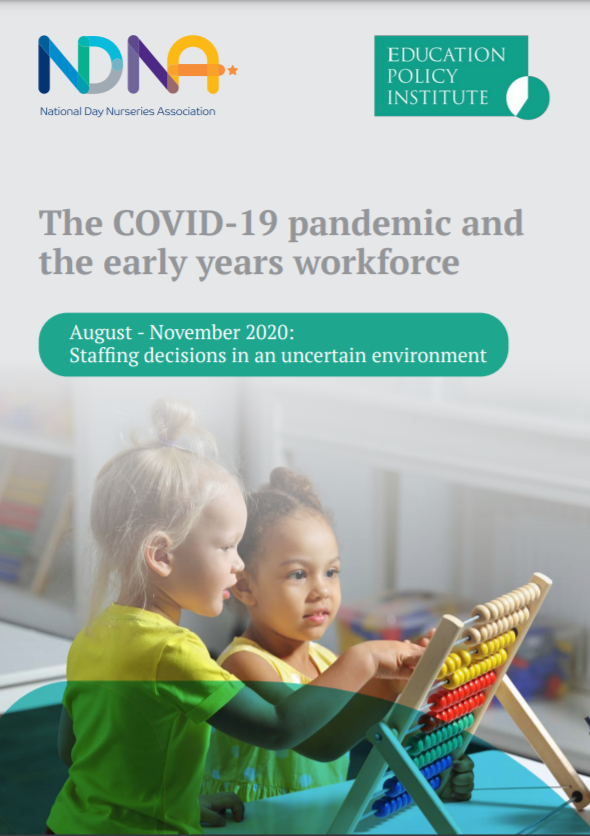This research finds that low attendance rates and a fall in families taking up government-funded early years education could lead to a shortfall in qualified staff in settings after the winter period.
The report, published by the Education Policy Institute (EPI) and National Day Nurseries Association (NDNA), shows that the demand for places in settings such as nurseries and pre-schools has still not returned to pre-pandemic levels. This lack of demand continues to cause financial instability for the early years sector, resulting in staff being made redundant, having their pay reduced, or voluntarily leaving settings.
The study warns that if demand for early years places rebounds next year, settings may be unable to find suitable replacements for those staff who have left over the last few months, which could compromise the quality of early years education on offer in the long term.
Drawing on a survey of settings representing over 10,000 early years staff across England, Scotland and Wales based in private, voluntary, and independent settings, researchers found that between August and November, 6% of early years staff were furloughed, while 1% of staff had been made redundant.
As many as 7% of early years staff ended up voluntarily terminating their contracts during this period, with a quarter (24%) of settings reporting that these employees did not return to their old jobs because they found alternative employment during furlough.
You can download the full report here.
Key findings
The fall in demand for early years education
Most early years settings in England, Scotland and Wales such as nurseries and pre-schools, faced closure between August and November:
- Three quarters (73%) of early years settings have had to fully or partially close.
- The most common reasons for closures was insufficient demand for places (72%) and staff members or children self-isolating (26%).
- Settings reported that 6% fewer children are currently attending than in a typical year.
- In England, fewer children are also taking up government-funded childcare places. The three main early years offers in England – the 15 hours entitlement for 2-year olds, the 15 hours for 3-4-year-olds and the 30 hours for 3-4-year-olds – all saw a significant decline in demand: around half of settings reported fewer children taking up these government-funded places.
Furloughed staff in the early years
The UK-wide furlough scheme was extended until March 2021, with a high proportion of early years staff still on the scheme. Staff were most likely to be furloughed if they held lower qualifications:
- Overall, 6% of early years staff have been on full-time furlough since August.
- 12% of staff with no qualifications had been furloughed.
- 8% of staff with level 3 or 4 qualifications (at least A level or equivalent) had been furloughed.
- 6% of staff with level 2 qualifications (GCSE or equivalent) had been furloughed.
- 6% of staff with level 6 qualifications (bachelor’s degree level or equivalent) had been furloughed.
Early years workforce volatility: staff leaving jobs and other trends
A significant proportion of early years staff have terminated their contracts or faced redundancies between August and November:
- As many as 7% of staff voluntarily terminated their contracts.
- A quarter (24%) of settings reported that these employees did not return to their jobs because they found alternative employment during their furlough period.
- 1% of early years staff faced forced redundancies over this period of three months.
- While many settings have had to make staff redundant or have seen staff voluntarily leave, the average size of the workforce is still estimated to have grown by 5% over this period, highlighting the varying experiences of early years providers. This could be an indicator that the sector is consolidating, with some settings able to expand while others reduce their operations or close.
- However, if the decline in demand for early years provision is temporary and demand increases after the winter, the loss of staff seen by some settings could prove costly. Many early years settings are likely to face significant challenges recruiting new staff, especially those with relevant qualifications.
Training and CPD for early years staff
Good training and CPD are a key part of supporting a high-quality early years workforce, but some professionals appear to be missing out on such opportunities:
- Two in five (41%) settings reported that they have no current need for CPD.
- Some gaps in staff training opportunities are apparent, with nearly half of settings saying there were not enough opportunities to access specialist training such as training on child trauma and bereavement or supporting children with special education needs and disabilities (SEND).
- Around a quarter of settings (23%) also said that there were too few opportunities for training on paediatric first aid, which is mandatory for some early years staff.



